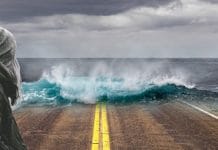Over 10 million tons of plastic waste enter the oceans each year. Floating plastic waste at sea has caught the public’s interest thanks to the ‘Blue Planet Effect’ seeing moves to discourage the use of plastic drinking straws and carrier bags. Yet such accumulations account for less than 1% of the plastic that enters the world’s oceans.
The missing 99% is instead thought to occur in the deep ocean, but until now it has been unclear where it actually ended up. Published this week in the journal Science, the research conducted by The University of Manchester (UK), National Oceanography Centre (UK), University of Bremen (Germany), IFREMER (France) and Durham University (UK) showed how deep-sea currents act as conveyor belts, transporting tiny plastic fragments and fibers across the seafloor.
These currents can concentrate microplastics within huge sediment accumulations, which they termed ‘microplastic hotspots’. These hotspots appear to be the deep-sea equivalents of the so-called ‘garbage patches’ formed by currents on the ocean surface.
In the ocean, they either settle out slowly, or can be transported rapidly by episodic turbidity currents — powerful underwater avalanches — that travel down submarine canyons to the deep seafloor (see the group’s earlier research in Environmental Science & Technology). Once in the deep sea, microplastics are readily picked up and carried by continuously flowing seafloor currents (‘bottom currents’) that can preferentially concentrate fibres and fragments within large drifts of sediment.
These deep ocean currents also carry oxygenated water and nutrients, meaning that seafloor microplastic hotspots can also house important ecosystems that can consume or absorb the microplastics. This study provides the first direct link between the behaviour of these currents and the concentrations of seafloor microplastics and the findings will help to predict the locations of other deep-sea microplastic hotspots and direct research into the impact of microplastics on marine life.


